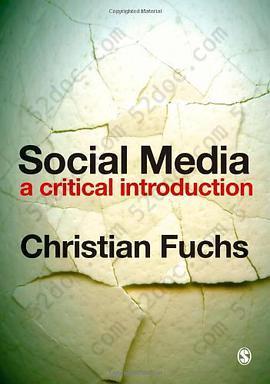注重体验与质量的电子书资源下载网站
分类于: 职场办公 其它
简介

Social Media: A Critical Introduction 豆 0.0分
资源最后更新于 2020-09-13 17:20:11
作者:Christian Fuchs
出版社:SAGE Publications Ltd
出版日期:2013-01
ISBN:9781446257319
文件格式: pdf
标签: 传播学 社交网络 Communication 批判理论 互联网 communication 英文原版 克里斯蒂安·富克斯
简介· · · · · ·
Now more than ever, we need to understand social media - the good as well as the bad. We need critical knowledge that helps us to navigate the controversies and contradictions of this complex digital media landscape. Only then can we make informed judgements about what's happening in our media world, and why.
Showing the reader how to ask the right kinds of questions about soci...
目录
DETAILED CONTENTS:
1. What is a Critical Introduction to Social Media? 1
Social Media and the Arab Spring
Social Media and the Occupy Movement
Unpaid Work for the Huffington Post
1.1. What is Social about Social Media? 4
Information and Cognition
Communication
Community
Collaboration and Cooperative Work
Information, communication, collaboration and community are forms of sociality. But what is now social about Facebook?
1.2. What is Critical Thinking and Why Does it Matter? 7
Power
Asking Critical Questions about Social Media and the Arab Spring
Asking Critical Questions about Social Media and the Occupy Movement
Asking Critical Questions about Unpaid Work for the Huffington Post
1.3. What is Critical Theory? 10
You want me to read Karl Marx? Are you nuts? Why the hell should I do that?
So, you tell me that Marx invented the Internet?
How can one define critical theory?
1) Critical theory has a normative dimension
2) Critical theory is a critique of domination and exploitation
3) Critical theory uses dialectical reasoning as a method of analysis
4) Critical theory is connected to struggles for a just and fair society, it is an intellectual dimension of struggles
5) Ideology critique: Critical theory is a critique of ideology
6) Critical theory is a critique of the political economy
1.4. Critical Theory Approaches 18
The Frankfurt School – Not a Sausage, but a Critical Theory!
Critical Political Economy of Media and Communication – Studying the Media and Communication Critically
Critical Political Economy and the Frankfurt School are two Critical Theories. But do we really need two of them?
Critical Theory and Critique of the Political Economy of Social Media
Recommended Readings and Exercises 25
I. FOUNDATIONS 29
2. What is Social Media? 31
2.1. Web 2.0 and Social Media 32
Web 2.0
Critiques of Web 2.0 and Social Media Optimism
How New are Social Media?
2.2. The Need of Social Theory for Understanding Social Media 35
Definitions of Web 2.0 and Social Media
Media and Social Theory
Émile Durkheim: The Social as Social Facts
Max Weber: The Social as Social Relations
Ferdinand Tönnies: The Social as Community
Karl Marx: The Social as Cooperative Work
2.3. Explaining Social Media with Durkheim, Weber, Marx and Tönnies 42
A Model of Human Sociality
Web 1.0, Web 2.0, Web 3.0
Empirically Studying Changes of the Web
2.4. Conclusion 48
Recommended Readings and Exercises 50
3. Social Media as Participatory Culture 52
3.1. The Notions of Participation and Participatory Culture 53
Social Media as Spreadable Media
Participatory Culture
Participatory Democracy
Ignoring Ownership, Capitalism and Class: Cultural and Political Reductionism
White Boys with “Participatory” Toys
3.2. Online Fan Culture and Politics 58
Fan Culture as Politics?
Is Online Fascism Participatory Culture?
3.3. Social Media and Participatory Culture 60
Social Media Capitalism
YouTube
Blogs
3.4. Henry Jenkins and Digital Labour 63
Dallas Smythe, Digital Labour and Henry Jenkins
Social Media and Fans, Fans, Fans – Did Occupy, the Arab Spring and WikiLeaks Never Happen?
3.5. Conclusion 65
Recommended Readings and Exercises 67
4. Social Media and Communication Power 69
4.1. Social Theory in the Information Age 71
What is Social Theory?
Castells: Social Theorist of the Internet in the Information Society?
4.2. Communication Power in the Network Society 72
Castells on Power: An Essential Feature of All Societies?
Communication Power and Technocratic Language
4.3. Communication Power, Social Media and Mass Self-communication 75
Mass Self-Communication
Autonomy
Power and Counterpower on the Internet and Social Media
Media Power as Cultural Power: John B. Thompson
Media Power as Multidimensional Form of Economic, Political and Cultural Power
The Asymmetric Dialectic of Media Power
The Stratified Online Sphere
Web 2.0 and 3.0
4.4. Communication Power in the Arab Spring and the Occupy Movement 83
2011: The Year of the Rebirth of History and Dangerous Dreaming
The Arab Spring and Occupy
Twitter and Facebook Revolutions?
Castells Falsified: Empirical Research on the Role of the Media in Social Movements
Jeffrey Juris, Paolo Gerbaudo and Miriyam Aouragh: For or against Castells?
4.5. Conclusion 87
Recommended Readings and Exercises 89
II. APPLICATIONS 95
5. The Power and Political Economy of Social Media 97
5.1. Social Media as Ideology: The Limits of the Participatory Social Media Hypothesis 98
Social Media: Participation as Ideology
The Limits of YouTube
The Limits of Facebook
The Limits of Google
The Limits of Twitter
The Corporate Colonization of Social Media
5.2. The Cycle of Capital Accumulation 103
5.3. Capital Accumulation and Social Media 105
Relative Surplus Value
Prosumption
Dallas Smythe, the Audience Commodity and Internet Prosumer Commodification
Prosumer Surveillance
Panoptic Sorting of Internet Prosumers
Capital Accumulation on Corporate Social Media
The Profit Rate and Social Media
The Rate of Exploitation and Social Media
Value and Social Media
Information – A Peculiar Good
Social Media Work
The Social Media Prosumer Commodity’s Price
The Law of Value on Social Media
Possible Breakdown and Alternatives
5.4. Free Labour and Slave Labour 117
The Social Factory
The Social Factory Online
The iSlave behind the iPhone
The Joy of the Phone and Computer in the West is the Blood and Sweat of Africans and Asians
The Knowledge Labour Aristocracy
The Internet as Division of Labour
5.5. Conclusion 121
Recommended Readings and Exercises 123
6. Google: Good or Evil Search Engine? 126
6.1. Introduction 127
The Ubiquity of Google
The Uncritical Celebration of Google
Scepticism towards Google
6.2. Google’s Political Economy 128
Google’s Economic Power
Google and the Capitalist Crisis
The Wealth and Power of Google’s Owners
How Google Accumulates Capital
Google as a Surveillance Machine
A Model of Society for Understanding Data Stored By Google
A Typology of the Data Google Monitors and Commodifies
6.3. Googology: Google and Ideology 132
The Ideology of the 20% Rule
Biopolitical Exploitation
Evgeny Morozov: Internet Solutionism
Ideologies Online: Internet Fetishism and Technological Online Rationality
Oscar Gandy: Rational Discrimination and Cumulative Disadvantage
Internet Fetishism and the Global Crisis
Stuart Hall Revisited: The Internet as Ideological Culture of Control
The Ideology of Google’s Privacy Policy
Google DoubleClick
Google+: Google and Social Networking Sites
The EU’s Data Protection Regulation
Google’s 2012 Privacy Policy
Sensitive Personal Data
Complex Terms of Use
6.4. Work at Google 141
Work at Google: Fun and Good Food?
The Reality of Work at Google: Working Long Hours
Working Long Hours? Never Mind, just Sleep under your Desk, as Former Google Vice-President Marissa Mayer Does…
6.5. Google: God and Satan in One Company 146
Marx and the Antagonism between Productive Forces and Relations of Production
Google in and Beyond Capitalism
6.6. Conclusion 149
Recommended Readings and Exercises 151
7. Facebook: A Surveillance Threat to Privacy? 153
7.1. Facebook’s Financial Power 154
Facebook’s Profits
2012: Facebook’s Decreasing Profits and Increasing Revenues
7.2. The Notion of Privacy 156
Different Definitions of Privacy
Criticisms of Privacy
Privacy: A Bourgeois Value?
Privacy and Surveillance
An Alternative Notion of Privacy
7.3. Facebook and Ideology 160
Like as Facebook Ideology: “I Like Auschwitz”
The Liberal Fetishism of Privacy
Privacy Fetishism in Research about Facebook
7.4. Privacy and the Political Economy of Facebook 163
Privacy and Private Property
7.4.1. Facebook’s Privacy Policy 164
Critical Discourse Analysis
Self-Regulation
Privacy Policy
Unambiguous Consent?
Opt-out?
Targeted Advertising
Instant Personalization
7.4.2. Exploitation on Facebook 169
Commodification and Digital Labour on Facebook
Surveillance and Privacy Violations on Facebook
The Private on Facebook: Private Ownership
7.5. Conclusion 171
Facebook: Ideology and Political Economy
Diaspora*: An Alternative to Facebook?
Recommended Readings and Exercises 175
8. Twitter and Democracy: A New Public Sphere? 176
8.1. Habermas’s Concept of the Public Sphere 181
What is the Public Sphere?
The Working Class Critique of the Public Sphere Concept
The Feminist Critique of the Public Sphere Concept
The Public Sphere: Political Communication and Political Economy
Habermas: No Idealization of the Public Sphere, but rather Public Sphere as Concept of Immanent Critique
8.2. Twitter, Social Media and the Public Sphere 185
Clay Shirky: Social Media as Radically New Enhancers of Freedom
Zizi Papacharissi: The Idealization of Individualization: The Private Sphere
Jodi Dean: Social Media Politics as Ideology
Malcolm Gladwell: Social Media – No Natural Enemies of the Status Quo
Evgeny Morozov: Social Media and Slacktivism/Clicktivism
Shirky’s Response to Gladwell and Morozov
8.3. Political Communication on Twitter 190
The Stratification of Twitter and Microblog Usage
The Asymmetrical Power of Visibility on Twitter
The Degree of Interactivity of Political Communication on Twitter
The 2011 Protests and Revolutions: Twitter and Facebook Revolutions?
The Role of Social Media in the Egyptian Revolution
The Role of Social Media in the Occupy Wall Street Movement
8.4. Twitter’s Political Economy 198
Twitter’s Terms of Service and Targeted Advertising
Capital Accumulation on Twitter
8.5. @JürgenHabermas #Twitter #PublicSphere 200
The Public Sphere and Political Communication on Twitter
The Public Sphere and the Visibility of the Powerful on Twitter
The Pseudo- and Manufactured Public Sphere
8.6. Conclusion 201
Technological Determinism
A Dialectical Concept of Technology and Society
A Model of (Social) Media and Revolution
Summary
Recommended Readings and Exercises 208
9. WikiLeaks: Can We Make Power Transparent? 210
9.1. WikiLeaks and Power 212
Uncritical Definitions of Surveillance
WikiLeaks and the Value-Neutral Definition of Surveillance
Critical Definitions of Surveillance
Foucault on Disciplinary Power
WikiLeaks and Critical Theory
WikiLeaks, Watchdogs and Transparency
WikiLeaks: Watching the Watchers Online
Theories of Power
WikiLeaks and the Power of Visibility
The Structural Discrimination of Watchdog Organizations
9.2. Wikileaks, Liberalism and Socialism 220
What is Liberalism?
What is Socialism?
WikiLeaks and Political Worldviews
“Good Governance”
Watching Corporate Power
9.3. WikiLeaks, Journalism and Alternative Media 225
What is a Journalist?
WikiLeaks and Mainstream Media
Economic, Political and Cultural Censorship of WikiLeaks
WikiLeaks: An Alternative Medium?
9.4. Conclusion 231
Recommended Readings and Exercises 233
10. Wikipedia: A New Democratic Form of Collaborative Work and Production? 235
10.1. The Communist Idea 237
The Return of Marx
Three Dimensions of Communism
The Subjective Dimension
The Objective Dimension
Communism = Participatory Democracy
The Subject-Object Dimension
10.2. Communication and Communism 242
The Communication Commons
The Commons-Based Internet
10.3. The Political Economy of Wikipedia 243
10.3.1.The Subjective Dimension of Wikipedia Production: Co-operative Labour 244
10.3.2. The Objective Dimensions of Wikipedia Production 244
The Common Ownership of the Means of Production
Relations of Production: Participatory Democracy in the Economic Realm
The Use-Value of Wikipedia: Free Content
10.3.3. The Effect Dimension of Wikipedia Production: The Pleasure of Co-operative Intellectual Work 247
10.4. Conclusion 247
Recommended Readings and Exercises 249
III. FUTURES 251
11. Conclusion: Social Media and its Alternatives – Towards aTruly Social Media 253
11.1. Social Media Reality: Ideologies and Exploitation 253
Ideology
Exploitation
Social Media: Anticipative and Limited Sociality
11.2. Social Media Alternatives 257
The Internet and the Logic of the Commons
Capitalism, Neoliberalism, Crisis
Struggles
11.2.1. Data Protection Laws 259
11.2.2. Opt-in Advertising Policies 260
11.2.3. Corporate Watch Platforms as a Form of Struggle against Corporatism 261
11.2.4. Alternative Internet Platforms 264
11.3. Towards a Truly Social Media and a New Society 264
References 267
Index 289
1. What is a Critical Introduction to Social Media? 1
Social Media and the Arab Spring
Social Media and the Occupy Movement
Unpaid Work for the Huffington Post
1.1. What is Social about Social Media? 4
Information and Cognition
Communication
Community
Collaboration and Cooperative Work
Information, communication, collaboration and community are forms of sociality. But what is now social about Facebook?
1.2. What is Critical Thinking and Why Does it Matter? 7
Power
Asking Critical Questions about Social Media and the Arab Spring
Asking Critical Questions about Social Media and the Occupy Movement
Asking Critical Questions about Unpaid Work for the Huffington Post
1.3. What is Critical Theory? 10
You want me to read Karl Marx? Are you nuts? Why the hell should I do that?
So, you tell me that Marx invented the Internet?
How can one define critical theory?
1) Critical theory has a normative dimension
2) Critical theory is a critique of domination and exploitation
3) Critical theory uses dialectical reasoning as a method of analysis
4) Critical theory is connected to struggles for a just and fair society, it is an intellectual dimension of struggles
5) Ideology critique: Critical theory is a critique of ideology
6) Critical theory is a critique of the political economy
1.4. Critical Theory Approaches 18
The Frankfurt School – Not a Sausage, but a Critical Theory!
Critical Political Economy of Media and Communication – Studying the Media and Communication Critically
Critical Political Economy and the Frankfurt School are two Critical Theories. But do we really need two of them?
Critical Theory and Critique of the Political Economy of Social Media
Recommended Readings and Exercises 25
I. FOUNDATIONS 29
2. What is Social Media? 31
2.1. Web 2.0 and Social Media 32
Web 2.0
Critiques of Web 2.0 and Social Media Optimism
How New are Social Media?
2.2. The Need of Social Theory for Understanding Social Media 35
Definitions of Web 2.0 and Social Media
Media and Social Theory
Émile Durkheim: The Social as Social Facts
Max Weber: The Social as Social Relations
Ferdinand Tönnies: The Social as Community
Karl Marx: The Social as Cooperative Work
2.3. Explaining Social Media with Durkheim, Weber, Marx and Tönnies 42
A Model of Human Sociality
Web 1.0, Web 2.0, Web 3.0
Empirically Studying Changes of the Web
2.4. Conclusion 48
Recommended Readings and Exercises 50
3. Social Media as Participatory Culture 52
3.1. The Notions of Participation and Participatory Culture 53
Social Media as Spreadable Media
Participatory Culture
Participatory Democracy
Ignoring Ownership, Capitalism and Class: Cultural and Political Reductionism
White Boys with “Participatory” Toys
3.2. Online Fan Culture and Politics 58
Fan Culture as Politics?
Is Online Fascism Participatory Culture?
3.3. Social Media and Participatory Culture 60
Social Media Capitalism
YouTube
Blogs
3.4. Henry Jenkins and Digital Labour 63
Dallas Smythe, Digital Labour and Henry Jenkins
Social Media and Fans, Fans, Fans – Did Occupy, the Arab Spring and WikiLeaks Never Happen?
3.5. Conclusion 65
Recommended Readings and Exercises 67
4. Social Media and Communication Power 69
4.1. Social Theory in the Information Age 71
What is Social Theory?
Castells: Social Theorist of the Internet in the Information Society?
4.2. Communication Power in the Network Society 72
Castells on Power: An Essential Feature of All Societies?
Communication Power and Technocratic Language
4.3. Communication Power, Social Media and Mass Self-communication 75
Mass Self-Communication
Autonomy
Power and Counterpower on the Internet and Social Media
Media Power as Cultural Power: John B. Thompson
Media Power as Multidimensional Form of Economic, Political and Cultural Power
The Asymmetric Dialectic of Media Power
The Stratified Online Sphere
Web 2.0 and 3.0
4.4. Communication Power in the Arab Spring and the Occupy Movement 83
2011: The Year of the Rebirth of History and Dangerous Dreaming
The Arab Spring and Occupy
Twitter and Facebook Revolutions?
Castells Falsified: Empirical Research on the Role of the Media in Social Movements
Jeffrey Juris, Paolo Gerbaudo and Miriyam Aouragh: For or against Castells?
4.5. Conclusion 87
Recommended Readings and Exercises 89
II. APPLICATIONS 95
5. The Power and Political Economy of Social Media 97
5.1. Social Media as Ideology: The Limits of the Participatory Social Media Hypothesis 98
Social Media: Participation as Ideology
The Limits of YouTube
The Limits of Facebook
The Limits of Google
The Limits of Twitter
The Corporate Colonization of Social Media
5.2. The Cycle of Capital Accumulation 103
5.3. Capital Accumulation and Social Media 105
Relative Surplus Value
Prosumption
Dallas Smythe, the Audience Commodity and Internet Prosumer Commodification
Prosumer Surveillance
Panoptic Sorting of Internet Prosumers
Capital Accumulation on Corporate Social Media
The Profit Rate and Social Media
The Rate of Exploitation and Social Media
Value and Social Media
Information – A Peculiar Good
Social Media Work
The Social Media Prosumer Commodity’s Price
The Law of Value on Social Media
Possible Breakdown and Alternatives
5.4. Free Labour and Slave Labour 117
The Social Factory
The Social Factory Online
The iSlave behind the iPhone
The Joy of the Phone and Computer in the West is the Blood and Sweat of Africans and Asians
The Knowledge Labour Aristocracy
The Internet as Division of Labour
5.5. Conclusion 121
Recommended Readings and Exercises 123
6. Google: Good or Evil Search Engine? 126
6.1. Introduction 127
The Ubiquity of Google
The Uncritical Celebration of Google
Scepticism towards Google
6.2. Google’s Political Economy 128
Google’s Economic Power
Google and the Capitalist Crisis
The Wealth and Power of Google’s Owners
How Google Accumulates Capital
Google as a Surveillance Machine
A Model of Society for Understanding Data Stored By Google
A Typology of the Data Google Monitors and Commodifies
6.3. Googology: Google and Ideology 132
The Ideology of the 20% Rule
Biopolitical Exploitation
Evgeny Morozov: Internet Solutionism
Ideologies Online: Internet Fetishism and Technological Online Rationality
Oscar Gandy: Rational Discrimination and Cumulative Disadvantage
Internet Fetishism and the Global Crisis
Stuart Hall Revisited: The Internet as Ideological Culture of Control
The Ideology of Google’s Privacy Policy
Google DoubleClick
Google+: Google and Social Networking Sites
The EU’s Data Protection Regulation
Google’s 2012 Privacy Policy
Sensitive Personal Data
Complex Terms of Use
6.4. Work at Google 141
Work at Google: Fun and Good Food?
The Reality of Work at Google: Working Long Hours
Working Long Hours? Never Mind, just Sleep under your Desk, as Former Google Vice-President Marissa Mayer Does…
6.5. Google: God and Satan in One Company 146
Marx and the Antagonism between Productive Forces and Relations of Production
Google in and Beyond Capitalism
6.6. Conclusion 149
Recommended Readings and Exercises 151
7. Facebook: A Surveillance Threat to Privacy? 153
7.1. Facebook’s Financial Power 154
Facebook’s Profits
2012: Facebook’s Decreasing Profits and Increasing Revenues
7.2. The Notion of Privacy 156
Different Definitions of Privacy
Criticisms of Privacy
Privacy: A Bourgeois Value?
Privacy and Surveillance
An Alternative Notion of Privacy
7.3. Facebook and Ideology 160
Like as Facebook Ideology: “I Like Auschwitz”
The Liberal Fetishism of Privacy
Privacy Fetishism in Research about Facebook
7.4. Privacy and the Political Economy of Facebook 163
Privacy and Private Property
7.4.1. Facebook’s Privacy Policy 164
Critical Discourse Analysis
Self-Regulation
Privacy Policy
Unambiguous Consent?
Opt-out?
Targeted Advertising
Instant Personalization
7.4.2. Exploitation on Facebook 169
Commodification and Digital Labour on Facebook
Surveillance and Privacy Violations on Facebook
The Private on Facebook: Private Ownership
7.5. Conclusion 171
Facebook: Ideology and Political Economy
Diaspora*: An Alternative to Facebook?
Recommended Readings and Exercises 175
8. Twitter and Democracy: A New Public Sphere? 176
8.1. Habermas’s Concept of the Public Sphere 181
What is the Public Sphere?
The Working Class Critique of the Public Sphere Concept
The Feminist Critique of the Public Sphere Concept
The Public Sphere: Political Communication and Political Economy
Habermas: No Idealization of the Public Sphere, but rather Public Sphere as Concept of Immanent Critique
8.2. Twitter, Social Media and the Public Sphere 185
Clay Shirky: Social Media as Radically New Enhancers of Freedom
Zizi Papacharissi: The Idealization of Individualization: The Private Sphere
Jodi Dean: Social Media Politics as Ideology
Malcolm Gladwell: Social Media – No Natural Enemies of the Status Quo
Evgeny Morozov: Social Media and Slacktivism/Clicktivism
Shirky’s Response to Gladwell and Morozov
8.3. Political Communication on Twitter 190
The Stratification of Twitter and Microblog Usage
The Asymmetrical Power of Visibility on Twitter
The Degree of Interactivity of Political Communication on Twitter
The 2011 Protests and Revolutions: Twitter and Facebook Revolutions?
The Role of Social Media in the Egyptian Revolution
The Role of Social Media in the Occupy Wall Street Movement
8.4. Twitter’s Political Economy 198
Twitter’s Terms of Service and Targeted Advertising
Capital Accumulation on Twitter
8.5. @JürgenHabermas #Twitter #PublicSphere 200
The Public Sphere and Political Communication on Twitter
The Public Sphere and the Visibility of the Powerful on Twitter
The Pseudo- and Manufactured Public Sphere
8.6. Conclusion 201
Technological Determinism
A Dialectical Concept of Technology and Society
A Model of (Social) Media and Revolution
Summary
Recommended Readings and Exercises 208
9. WikiLeaks: Can We Make Power Transparent? 210
9.1. WikiLeaks and Power 212
Uncritical Definitions of Surveillance
WikiLeaks and the Value-Neutral Definition of Surveillance
Critical Definitions of Surveillance
Foucault on Disciplinary Power
WikiLeaks and Critical Theory
WikiLeaks, Watchdogs and Transparency
WikiLeaks: Watching the Watchers Online
Theories of Power
WikiLeaks and the Power of Visibility
The Structural Discrimination of Watchdog Organizations
9.2. Wikileaks, Liberalism and Socialism 220
What is Liberalism?
What is Socialism?
WikiLeaks and Political Worldviews
“Good Governance”
Watching Corporate Power
9.3. WikiLeaks, Journalism and Alternative Media 225
What is a Journalist?
WikiLeaks and Mainstream Media
Economic, Political and Cultural Censorship of WikiLeaks
WikiLeaks: An Alternative Medium?
9.4. Conclusion 231
Recommended Readings and Exercises 233
10. Wikipedia: A New Democratic Form of Collaborative Work and Production? 235
10.1. The Communist Idea 237
The Return of Marx
Three Dimensions of Communism
The Subjective Dimension
The Objective Dimension
Communism = Participatory Democracy
The Subject-Object Dimension
10.2. Communication and Communism 242
The Communication Commons
The Commons-Based Internet
10.3. The Political Economy of Wikipedia 243
10.3.1.The Subjective Dimension of Wikipedia Production: Co-operative Labour 244
10.3.2. The Objective Dimensions of Wikipedia Production 244
The Common Ownership of the Means of Production
Relations of Production: Participatory Democracy in the Economic Realm
The Use-Value of Wikipedia: Free Content
10.3.3. The Effect Dimension of Wikipedia Production: The Pleasure of Co-operative Intellectual Work 247
10.4. Conclusion 247
Recommended Readings and Exercises 249
III. FUTURES 251
11. Conclusion: Social Media and its Alternatives – Towards aTruly Social Media 253
11.1. Social Media Reality: Ideologies and Exploitation 253
Ideology
Exploitation
Social Media: Anticipative and Limited Sociality
11.2. Social Media Alternatives 257
The Internet and the Logic of the Commons
Capitalism, Neoliberalism, Crisis
Struggles
11.2.1. Data Protection Laws 259
11.2.2. Opt-in Advertising Policies 260
11.2.3. Corporate Watch Platforms as a Form of Struggle against Corporatism 261
11.2.4. Alternative Internet Platforms 264
11.3. Towards a Truly Social Media and a New Society 264
References 267
Index 289








